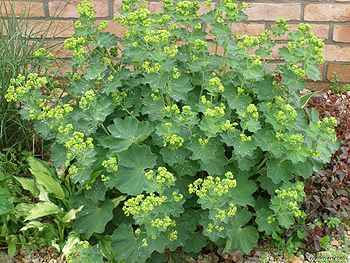Lady's Mantle
From Wikiwel
(Redirected from Alchemilla Vulgaris)
Other Names: Alchemilla vulgaris, Alchemilla Mollis, Alchemilla xanthochlora, Alquimila, Alquimilla, Feuilles d'Alchémille, Frauenmantelkraut, Leontopodium, Lion's Foot, Manto de la Virgen, Marienmantel, Nine Hooks, Nueve Ganchos, Pie de León, Silerkraut, Stellaria.
Alchemilla vulgaris is similar to A. mollis, but tends to have a looser, more spreading habit. Alchemilla is an herb. The parts that grow above the ground are used to make medicine.
Special Precautions of Lady's Mantle
- So far, alchemilla seems to be safe for most people when taken by mouth. Although some German researchers warn about possible liver damage, other experts consider the concern to be exaggerated.
- There is very little information available about the safety of applying alchemilla to the skin.
- Although it never has been proven that lady’mantle could cause a miscarriage, it is recommended that pregnant women avoid using it, at least during the early stages in the pregnancy and then only under the guidance of a professional health care provider or a certified herbalist.
Benefits and uses of Lady's Mantle are
Alchemilla contains chemicals called tannins, which might help diarrhea.
- Diarrhea.
- Diabetes.
- Heavy or painful menstrual periods.
- muscle spasms
- nausea
- sore throat
- Wound healing : Preliminary research suggests that lady's mantle shows promise in the treatment of wounds. In a 2007 study published in Phytotherapy Research, for instance, tests on rats determined that lady's mantle may promote the growth of certain cells that play a key role in wound healing.
- Mouth Ulcers : Lady's mantle may aid in the healing of mouth ulcers, according to a small study published in Clinical Drug Investigation in 2006.
- Stomach disorders.
- Skin conditions such as ulcers, eczema, and rashes, when applied to the skin.
- Bleeding, when applied to the skin.
- The herb’s astringent effect may be useful in treating bowel disorders such as bloody stools and diarrhea.
References
- Culpeper, Nich: Culpeper’s Complete Herbal. Hertfordshire, Wordsworth 1995.
- Fischer-Rizzi, Susanne: Medicine of the Earth. Legends, recipes, remedies, and cultivation of healing plants. Portland, Rudra Press 1996.
- Hoffmann, David: Healthy Digestion. Dublin, Newleaf 2001.
- Peirce, Andrea: The American Pharmaceutical Association Practical Guide to Natural Healing. New York, William Morrow and Company, Inc. 1999.
- Wood, Matthew: The Book of Herbal Wisdom. Using Plants as Medicines. Berkeley, North Atlantic Books 1997.
